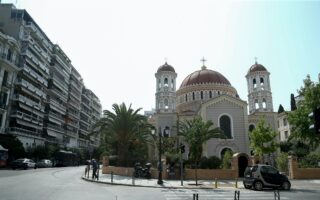The month of June – past and present

I am sitting at a desk in the London Library, the oldest private library in Britain and a blissful retreat in the heart of this city to research and study. I have a view over Victorian rooftops of the Houses of Parliament, where, as I write, politicians are debating and making decisions that will affect me and all those who sit quietly around me. It’s a sunny day, the windows are open and a light breeze lifts the pages of my diary, and I am reminded that it is almost eight years ago that the UK’s referendum on whether or not to stay in Europe was held. It is coming up to a decade since the June day when we woke up to the news that Britain was turning its back on the European family.
I remember when we joined Europe in 1972 and how exciting it had seemed back then. I was 12 but I knew it was important. My mother’s partner was Parisian and owned a small apartment in his home city, so during my teenage years, I took the ferry then the train several times a year with my sister to explore even the most obscure parts of Paris. Every Impressionist painting, every Rodin sculpture, every taste from a bistro, boulangerie or patisserie was new and thrilling. I was more or less bilingual and felt a total sense of belonging across that short stretch of water known by the British as the English Channel, but by the French as La Manche (meaning “the sleeve”). It was a kinship I felt for the whole of the continent, not just France.
In short, Brexit, a word derived from Grexit, has been a disaster. And I think my tears proved to be for good reasons. Britain made the mistake that Greece did not
On waking up to the news in 2016 that there had been a 52% vote in favor of leaving Europe, I ranted and raved. That June day, I was interviewed by a Greek radio station and lost control over my emotions. To my shame, I cried on live radio. They were tears both of sadness and anger. It was frustration too because it is true to say that those in favor of staying had been apathetic. All of my friends and acquaintances had voted to remain. It hadn’t really occurred to any of us that people would be foolish enough to vote “leave.” Meanwhile, the Right had campaigned hard, up and down the country, inciting nostalgia, racism and dislike of “foreign” involvement in our political and economic affairs. It was a complacency that we paid for dearly. I would have gone out knocking on doors if I had realized that so many people wanted a return to the past. Did I bother? No. I really hadn’t thought it was necessary.
There is no satisfaction now in knowing that the polls all show that most Britons see Brexit as a huge failure. It has cost billions of pounds so far, trade is at a record low, and the average Brit is £2,000 per annum worse off, as well as disillusioned by the lies they were told about improvement to our health service (it has spectacularly deteriorated). Only 30% of people now believe Brexit was right, but it is too late to turn back.
In short, Brexit, a word derived from Grexit, has been a disaster. And I think my tears proved to be for good reasons. Britain made the mistake that Greece did not. It’s a small compensation that we now have a general election to look forward to in July, which will give the UK the opportunity to remove many of those politicians who took us out of Europe – including David Cameron, who called the referendum in the first place and somehow crept back into power last year, this time as foreign secretary.
My diary reminds me of another anniversary, a summer’s day, four years after Brexit. I had a phone call from the prime minister. Not of the UK. If it had been Boris Johnson, I would have rejected the call. It was Kyriakos Mitsotakis, to say that the president had granted me honorary Greek citizenship. Yes, there were tears again that day. But this time they were tears of joy. I felt then, and still do, that I am immensely lucky. Being Greek is one reason why, but being European once again is another.
In the last European elections in 2019, Britain voted for the final time and I remember the terrible sense of loss as I cast my ballot.
In my diary, I see an entry inked in for June 9. When I turn up at the village school near my house in Crete, Greek ID card in one hand, sharpened pencil in the other, my heart will be thumping with excitement. There is no doubt in my mind that when something that was lost is returned to you, your appreciation of it is all the greater. And, more crucially, the existence of the European Union has never been more important than it is now, in this turbulent and precarious world.
Victoria Hislop is an English author. Her latest book, “The Figurine” (published in Greek by Psichogios), addresses the issue of antiquities theft.





